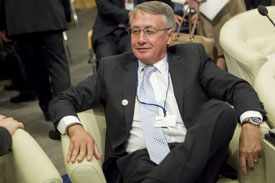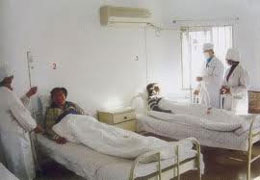
TODAY'S SAINT : MAY 15 : ST. ISIDORE THE FARMER
TODAY'S MASS ONLINE : TUES. MAY 15, 2012
VATICAN : POPE : WORLD MEETING OF FAMILIES AND OTHER NEWS
POPE TO VISIT MILAN FOR WORLD MEETING OF FAMILIES (IMAGE SOURCE: RADIO VATICANA|)
Vatican City, 15 May 2012 (VIS) - The Holy Father will visit the archdiocese of Milan on the occasion of the 7th World Meeting of Families to take place in that Italian city.
Benedict XVI will depart from Rome's Ciampino Airport on 1 June at 4:00pm and will arrive an hour later in Milan. At 5:30pm he will address those gathered in the Piazza del Duomo and, at 7:30pm, will attend a concert in his honour and that of the official delegations to the World Meeting of Families at the Scala Theatre.
On Saturday, 2 June, at 10:00am, the Pope will participate in the "Hora Media" at the cathedral. He will read the meditation and will venerate the relics of St. Charles Borromeo. At 11:15am in Meazza Stadium, he will greet children who are being confirmed and will then give a speech and pray the Angelus. At 5:00pm in the Throne Room of the bishop's palace he will meet with civil authorities and, at 8:30pm, will address the participants of the "Celebration of Witnesses" that will take place in the metropolitan park of Bresso.
On Sunday, 3 June, at 10:00am in Bresso's park, he will celebrate Holy Mass and will pray the Angelus. At 1:15pm, after lunch in the bishop's palace with cardinals, bishops, and some families, he will greet members of the Family Foundation 2012 and the organizers of the visit.
Benedict XVI's return flight to Rome will arrive at Ciampino Airport at 5:30pm, from where he will travel by helicopter to the Vatican heliport where he is expected to arrive at 6:45pm.
UNLAWFUL USE OF POPE'S IMAGE: BENETTON RETRACTION
Vatican City, 15 May 2012 (VIS) - This morning a note from the Director of the Holy See Press Office, Fr. Federico Lombardi, S.J., was issued on the conclusion of the legal conflict between the Holy See and the Benetton Group, due to its unlawful use of Pope Benedict XVI's image in the "Unhate" ad campaign.
"Last Friday," reads the communique, "the Benetton Group published a note ... reaffirming its 'regret for having offended His Holiness Benedict XVI and believers', and assuring that it 'guarantees and maintains that all photographic images of the Holy Father have been retracted from commercial distribution and promises not to use the image of the Holy Father in the future without authorization from the Holy See'". It ends with stating that "the Benetton Group will use its resources to stop the further use of the image by third parties on internet sites and in other places".
"The communique of the Benetton Group," emphasizes Fr. Lombardi, "represents the conclusion, based on an agreed settlement, of the conflict between the lawyers of the Holy See ... and those of the Benetton Group, a conflict that took place, as announced, and has been open until now. The Benetton Group recognizes therefore ... that the Pope's image must be respected".
"The Holy See did not seek monetary compensation. Nevertheless, moral compensation in recognition of the abuse committed has been sought as well as affirming the desire to defend, even by legal means, the Pope's image. In place of monetary compensation it has asked and received from the Benetton Group an act of generosity, effective even if limited, toward one of the Church's charitable activities".
CARITAS IN THE MEDITERRANEAN: DIALOGUE BETWEEN TWO SHORES
Vatican City, 15 May 2012 (VIS) - The 2012 meeting of MigraMed for all the Caritas organizations that operate in the Mediterranean countries will open in Cagliari, Italy tomorrow, 16 May. This year's forum is dedicated to the dialogue between the two shores of "Mare Nostrum" and will touch on, among other themes, the conflict in the Middle East and North Africa as well as the reception of emigrants and perspectives of emigration.
"A year after the Arab Spring and during the financial, economic, and social crisis that Europe is undergoing, Caritas in the Mediterranean, North African, Middle Eastern, and European areas will meet with Caritas Italy and the diocesan Caritas organizations on the theme of emigrants and the politics of development and welcome", reads a communique from Caritas Italy.
From 16 to 18 May will see the discussion on, among other themes to be analysed, Italy's system of welcome to those who have fled Libya: 3,000 of the 20,000 reception points in this country are administered under the umbrella of diocesan Caritas throughout the Italian territories.
The topic of interreligious dialogue will also be addressed because the Caritas organizations on the southern shore of the Mediterranean are found in countries that are, for the most part, Islamic. In this context, Caritas organizations from Libya, Morocco, Algeria, Lebanon, Turkey, and Tunisia will take part. Likewise Caritas from France, Germany, Spain, Greece, Malta, and Albania as well as representatives from Caritas in the Middle East will participate.
The meeting will provide the opportunity to evaluate the present and future of emigration in the Mediterranean in light of the transformation in the Middle East and North Africa, along with Europe's role during this economic crisis and the humanitarian emergency of refugees.
OTHER PONTIFICAL ACTS
Vatican City, 15 May 2012 (VIS) - Today the Holy Father appointed:
- Bishop Gabriel Justice Yaw Anokye as archbishop of the Archdiocese of Kumasi (area 5,118, population 1,744,000, Catholics 401,000, priests 112, religious 615), Ghana. He succeeds Archbishop Thomas Kwaku Mensah, whose resignation from the pastoral care of the same archdiocese the Holy Father accepted, upon having reached the age limit.
- Bishop Varghese Chakkalakal of Kannur, India, as bishop of Calicut (area 12,505, population 10,453,000, Catholics 50,201, priests 125, religious 833), India. Concurrently he is named as the apostolic administrator "sede vacanate et ad nutum Sanctae Sedis" of the diocese of Kannur.
- Bishop Roberto Calara Mallari, previously auxiliary of San Fernando, Philippines, as bishop of San Jose (area 2,540, population 819,000, Catholics 725,000, priests 33, religious 34), Philippines.
AUSTRALIA : PERSONAL ORDINARIATE FOR JUNE 15
ARCHDIOCESE OF MELBOURNE RELEASE
| Personal Ordinariate to be established in Australia on 15 June |  |

|
 Monday 14 May 2012 Monday 14 May 2012The President of the Australian Catholic Bishops Conference, Archbishop Denis Hart, announced on Friday 11 May that Pope Benedict XVI intends to announce the establishment in Australia of a Personal Ordinariate for Former Anglicans to commence on 15th June 2012.  A Personal Ordinariate is a church structure for particular groups of
people who wish to enter into communion with the Catholic Church. A Personal Ordinariate is a church structure for particular groups of
people who wish to enter into communion with the Catholic Church.In 2009 Pope Benedict announced special arrangements to cater for groups of Anglicans who wished to join the Catholic Church. This provision allows them to maintain some of the traditions of prayer and worship of Anglicanism. Personal Ordinariates have already been established in the United Kingdom (2011) and the United States of America (2012). The Australian Bishops have already put in place procedures to enable clergy and lay church members to join the Catholic Church through the Ordinariate. Archbishop Hart hopes that there will be a warm welcome to those wishing to enter the Catholic Church through the Ordinariate. “I am confident that those former Anglicans who have made a journey in faith that has led them to the Catholic Church will find a ready welcome”, he said. This new community will have the status of a diocese and will be known as the Personal Ordinariate of Our Lady of the Southern Cross under the patronage of St Augustine of Canterbury. SOURCE : ARCHDIOCESE OF MELBOURNE |
AMERICA : CANADA BISHOPS RELEASE LETTER ON CONSCIENCE
CCCB REPORT:
 (CCCB –
(CCCB – Ottawa Canada
“Legitimate secularity draws a distinction between religion and politics, between Church and state,” the pastoral letter states, but is open to the engagement of religious beliefs and faith communities in public debate and civic life. “Radical secularism”, however, excludes religion from the public square “and from freely engaging in the public debate necessary for shaping civic life.”
In its pastoral letter, the Permanent Council explains why freedom of religion and conscience is necessary for the common good of countries such asCanada
The Most Reverend Richard Smith, Archbishop of Edmonton and President of the CCCB, noted in his introduction to the pastoral letter that it is “addressed to everyone of good will, calls on Catholics, all believers, and even those of no faith, 1) to affirm the right of religion to be active in the public square, 2) to maintain healthy Church-State relations, 3) to form consciences according to objective truth, and 4) to protect the right to conscientious objection.” Archbishop Smith also noted the letter was being released in preparation for Pentecost. He said the pastoral letter “encourages all faith communities to contribute to the formulation of public policy and the common good, and concludes by exhorting believers not to compromise their convictions, but to stand up for their faith, even if they must suffer for it.”
The CCCB Permanent Council serves as the CCCB administrative board. Currently composed of 12 Catholic Bishops from across the country, it is responsible for overseeing the activities and policies of the Conference between the annual meetings of the Plenary Assembly of all the Bishops of Canada, and approving how the decisions and recommendations of the Plenary Assembly are implemented.
The letter can be downloaded freely from www.cccb.ca. The printed version can be ordered from the CCCB Publications Service at www.cccbpublications.ca/
PDF of the pastoral letter
Introduction to the pastoral letter by the President of the CCCB
Summary of the pastoral letter
Questions for reflection
To order copies
|
|
|
 (CCCB –
(CCCB – “Legitimate secularity draws a distinction between religion and politics, between Church and state,” the pastoral letter states, but is open to the engagement of religious beliefs and faith communities in public debate and civic life. “Radical secularism”, however, excludes religion from the public square “and from freely engaging in the public debate necessary for shaping civic life.”
In its pastoral letter, the Permanent Council explains why freedom of religion and conscience is necessary for the common good of countries such as
The Most Reverend Richard Smith, Archbishop of Edmonton and President of the CCCB, noted in his introduction to the pastoral letter that it is “addressed to everyone of good will, calls on Catholics, all believers, and even those of no faith, 1) to affirm the right of religion to be active in the public square, 2) to maintain healthy Church-State relations, 3) to form consciences according to objective truth, and 4) to protect the right to conscientious objection.” Archbishop Smith also noted the letter was being released in preparation for Pentecost. He said the pastoral letter “encourages all faith communities to contribute to the formulation of public policy and the common good, and concludes by exhorting believers not to compromise their convictions, but to stand up for their faith, even if they must suffer for it.”
The CCCB Permanent Council serves as the CCCB administrative board. Currently composed of 12 Catholic Bishops from across the country, it is responsible for overseeing the activities and policies of the Conference between the annual meetings of the Plenary Assembly of all the Bishops of Canada, and approving how the decisions and recommendations of the Plenary Assembly are implemented.
The letter can be downloaded freely from www.cccb.ca. The printed version can be ordered from the CCCB Publications Service at www.cccbpublications.ca/
PDF of the pastoral letter
Introduction to the pastoral letter by the President of the CCCB
Summary of the pastoral letter
Questions for reflection
To order copies
ASIA : CHINA : CHEN'S NEPHEW WRONGFULLY ACCUSED
ASIA NEWS REPORT:
He defended himself against agents who burst into his house after his uncle escaped. The charges are baseless because no one died. For this reason, the authorities are preventing lawyers from seeing him.
_0515_-_Chen.jpg)
Beijing (AsiaNews) - Chen Kegui, nephew of blind dissident Chen Guangcheng, was arbitrarily arrested by police in Shandong. He has been denied access to his family lawyer and his wife has been placed under house arrest. The nephew was taken into custody on 9 May for his role in Chen's escape on 26 April to the US Embassy in Beijing, the China Human Rights Defender (CHRD) reported. The latter monitors human rights in China.
Chen Kegui is accused of "intentional homicide" because during the dissident's escape, he used a knife in self-defence against agents and unidentified people who burst into his uncle's home, slightly wounding some of the attackers. Why he was charged with homicide is unclear since no one died.
Chen Kegui's mother, Ren Zongju, was released on bail after being briefly detained.
Chen's lawyers have not been allowed to meet their client, who could get the death penalty.
Liu Weiguo, the lawyer authorised by Chen Guangcheng's wife, was warned not to go to Linyi to help Chen Kegui. Another lawyer, Chen Wuquan, had his licence to practice taken away. Song Ze, a volunteer with a legal association, disappeared.
After an incredible escape from his home, the blind dissident, famous for his opposition to forced abortions and land grabs, found refuge in the US Embassy in Beijing.
After officials convinced him to leave the compound, he was taken to a hospital in the Chinese capital where he is under constant watch.
Meanwhile, the authorities launched a campaign against his family and friends.
He defended himself against agents who burst into his house after his uncle escaped. The charges are baseless because no one died. For this reason, the authorities are preventing lawyers from seeing him.
_0515_-_Chen.jpg)
Beijing (AsiaNews) - Chen Kegui, nephew of blind dissident Chen Guangcheng, was arbitrarily arrested by police in Shandong. He has been denied access to his family lawyer and his wife has been placed under house arrest. The nephew was taken into custody on 9 May for his role in Chen's escape on 26 April to the US Embassy in Beijing, the China Human Rights Defender (CHRD) reported. The latter monitors human rights in China.
Chen Kegui is accused of "intentional homicide" because during the dissident's escape, he used a knife in self-defence against agents and unidentified people who burst into his uncle's home, slightly wounding some of the attackers. Why he was charged with homicide is unclear since no one died.
Chen Kegui's mother, Ren Zongju, was released on bail after being briefly detained.
Chen's lawyers have not been allowed to meet their client, who could get the death penalty.
Liu Weiguo, the lawyer authorised by Chen Guangcheng's wife, was warned not to go to Linyi to help Chen Kegui. Another lawyer, Chen Wuquan, had his licence to practice taken away. Song Ze, a volunteer with a legal association, disappeared.
After an incredible escape from his home, the blind dissident, famous for his opposition to forced abortions and land grabs, found refuge in the US Embassy in Beijing.
After officials convinced him to leave the compound, he was taken to a hospital in the Chinese capital where he is under constant watch.
Meanwhile, the authorities launched a campaign against his family and friends.
EUROPE : BBC HEAD OF RELIGION GIVES LECTURE
IND. CATH. NEWS REPORT:
|
AFRICA : MALI : AWAITING APPOINTMENT OF NEW PRESIDENT
Agenzia Fides REPORT – People are waiting for the appointment
of the new President of the transition in Mali. "The mediators of the ECOWAS
(Economic Community of West African States) were in Bamako for 5 days, but
failed to bring the various parties to agree on appointing a new President of
the transition" says to Fides Fr. Edmond Dembele Secretary of the Episcopal
Conference of Mali. On May 22, the interim period of the government ends,
initiated under the agreement reached on April 6 by the military junta (which
took power with the coup on 22 March) and by the Malian political parties, with
the mediation of ECOWAS. Interim President is Dioncounda Traoré who appointed
Cheick Modibo Diarra as Premier (see Fides 18/05/2012).
"The ECOWAS wants Dioncounda Traore to continue to be the President of the transition, but the military junta would like another person," says FR. Dembele. ECOWAS threatened to reintroduce sanctions imposed against the coup on April 2 and then suspended after the agreement on April 6.
"The ECOWAS mediators should be back today in Bamako," says Fr. Dembele to Fides. "Yesterday, the leaders of the junta held a press conference in which they launched a proposal to hold a big meeting with all national social and political forces of the nation to designate the President of the transition. But it seems that the ECOWAS is not favorable to this proposal. Religious Catholic, Protestant and Muslim leaders, continue to mediate to try to find a solution to the crisis, " added the Secretary of the Episcopal Conference of Mali.
As for the north of Mali, in the hands of a series of armed groups, Fr. Dembele says that "the State last weekend, along with the High Islamic Council, and an association of citizens from the north that are in Bamako, sent food and medicines to the people of Tomboctou, Gao and Kidal."
In the north the tension for both the divisions between the various armed groups that control the area, and for the people’s impatience against the oppression of Islamists is increasing. "A recent meeting between the armed movements in the north to find a way to manage the region seems to have failed. This is because the groups have different goals: some want to impose the sharia and others who struggle for independence in the north. In Gao the young took to the streets to protest against the imposition of the Sharia law that provides for the prohibition of games (football and cards), music and television."
Previously the destruction of an important Islamic shrine in Tomboctou (the Islamists are in fact iconoclasts) had provoked the protests of local people and Muslim associations: the High Islamic Council has formally condemned this act. (L.M.) (Agenzia Fides 15/5/2012)
"The ECOWAS wants Dioncounda Traore to continue to be the President of the transition, but the military junta would like another person," says FR. Dembele. ECOWAS threatened to reintroduce sanctions imposed against the coup on April 2 and then suspended after the agreement on April 6.
"The ECOWAS mediators should be back today in Bamako," says Fr. Dembele to Fides. "Yesterday, the leaders of the junta held a press conference in which they launched a proposal to hold a big meeting with all national social and political forces of the nation to designate the President of the transition. But it seems that the ECOWAS is not favorable to this proposal. Religious Catholic, Protestant and Muslim leaders, continue to mediate to try to find a solution to the crisis, " added the Secretary of the Episcopal Conference of Mali.
As for the north of Mali, in the hands of a series of armed groups, Fr. Dembele says that "the State last weekend, along with the High Islamic Council, and an association of citizens from the north that are in Bamako, sent food and medicines to the people of Tomboctou, Gao and Kidal."
In the north the tension for both the divisions between the various armed groups that control the area, and for the people’s impatience against the oppression of Islamists is increasing. "A recent meeting between the armed movements in the north to find a way to manage the region seems to have failed. This is because the groups have different goals: some want to impose the sharia and others who struggle for independence in the north. In Gao the young took to the streets to protest against the imposition of the Sharia law that provides for the prohibition of games (football and cards), music and television."
Previously the destruction of an important Islamic shrine in Tomboctou (the Islamists are in fact iconoclasts) had provoked the protests of local people and Muslim associations: the High Islamic Council has formally condemned this act. (L.M.) (Agenzia Fides 15/5/2012)
TODAY'S MASS ONLINE : TUES. MAY 15, 2012
| John
16: 5 - 11
| |
| 5 | But now I am going to him who sent me; yet none of you asks me, `Where are you going?' |
| 6 | But because I have said these things to you, sorrow has filled your hearts. |
| 7 | Nevertheless I tell you the truth: it is to your advantage that I go away, for if I do not go away, the Counselor will not come to you; but if I go, I will send him to you. |
| 8 | And when he comes, he will convince the world concerning sin and righteousness and judgment: |
| 9 | concerning sin, because they do not believe in me; |
| 10 | concerning righteousness, because I go to the Father, and you will see me no more; |
| 11 | concerning judgment, because the ruler of this world is judged. |
TODAY'S SAINT : MAY 15 : ST. ISIDORE THE FARMER
St. Isidore the Farmer
PATRON OF SPANISH FARMERS, MIRACLE WORKER
Feast: May 15
 Information:
|
|
It is a misfortune which
deserves to be lamented with floods of tears, that ignorance, obstinacy, and
vice should so often taint a country life, the state which of all others is most
necessary and important to the world; the most conformable to a human condition
and to nature; the state which was sanctified by the example of the primitive
holy patriarchs, and which affords the most favorable opportunities for the
perfect practice of every virtue and Christian duty. What advantageous helps to
piety did the ancient hermits seek in the deserts, which the circumstances of a
country laborer do not offer? The life of St. Isidore is a most sensible proof
of this assertion. He was born at Madrid, of poor but very devout parents, and
was christened Isidore from the name of their patron, St. Isidore of Seville.
They had not the means to procure him learning or a polite education; but, both
by word and example, they infused into his tender soul the utmost horror and
dread of all sin, and the most vehement ardor for every virtue, and especially
for prayer. Good books are a great help to holy meditation; but not
indispensably requisite. St. Irenaeus mentions whole nations which believed in
Christ, and abounded in exemplary livers, without knowing the use of ink or
paper. Many illustrious anchorets knew no other alphabet than that of humility
and divine charity. The great St. Antony himself could not so much as read the
Greek or Latin languages: nay, from the words of St. Austin, some doubt whether
he could read even his own barbarous Egyptian dialect. Yet in the science of the
saints, what philosopher or orator ever attained to the A B C of that great man?
Learning, if it puffs up the mind, or inspires any secret self-sufficiency, is
an impediment to the communications of the Holy Ghost: simplicity and sincere
humility being the dispositions which invite him into the soul. By these was
Isidore prepared to find him an interior instructor and comforter. His
earnestness in seeking lessons and instructions of piety made him neglect no
opportunity of hearing them; and so much the more tender and the deeper were the
impressions which they left in his soul, as his desire was the stronger and the
more pure. His patience in bearing all injuries and in overcoming the envy of
fellow-servants by cordial kindnesses, his readiness to obey his masters, and in
indifferent things to comply with the inclinations of others, and humbly to
serve every one, gave him the most complete victory over himself and his
passions. Labor he considered as enjoined him by God in punishment of sin, and
for a remedy against it. And he performed his work in a spirit of compunction
and penance. Many object that their labors and fatigues leave them little time
for the exercises of religion. But Isidore, by directing his attention according
to the most holy motives of faith, made his work a most perfect act of religion.
He considered it as a duty to God. Therefore he applied himself to it with great
diligence and care, in imitation of the angels in heaven, who in all things
fulfil the will of God with the greatest readiness and alacrity of devotion. The
more humbling and the more painful the labor was, the dearer it was to the
saint, being a means the more suitable to tame his flesh, and a more noble part
of his penance. With the same spirit that the saints subdued their bodies by
toils in their deserts, Isidore embraced his task. He moreover sanctioned it by
continual prayer. While his hand held the plough, he in his heart conversed with
God, with his angel guardian, and the other blessed spirits; sometimes deploring
the sins of the world, and his own spiritual miseries, at other times in the
melting words of the royal prophet, raising his desires to the glory of the
heavenly Jerusalem. It was chiefly by this perfect spirit of prayer, joined
with, or rather engrafted upon a most profound humility and spirit of
mortification, that St. Isidore arrived at so eminent a degree of sanctity as
rendered him the admiration of all Spain. In his youth he was retained servant
by a gentleman named John de Vargas of Madrid, to till his land and do his
husbandry work. The saint afterwards took a most virtuous woman to wife, named
Mary Toribia. Those who call her de la Cabeza were deceived by a chapel to which
that name is given, because her head is kept in it. After the birth of one
child, which died young, the parents, by mutual consent, served God in perfect
continency. St. Isidore continued always in the service of the same master. On account of his fidelity, he could say to him as Jacob did to Laban,1 that, to guard and improve his stock, he had often watched the nights, and had suffered the scorching heats of summer, and the cold of winter; and that the stock, which he found small, had been exceedingly increased in his hands. Don John de Vargas, after long experience of the treasure he possessed in this faithful ploughman, treated him as a brother, according to the advice of Ecclesiasticus,2 Let a wise servant be dear to thee as thy own soul. He allowed him the liberty of assisting daily at the public office of the church. On the other side, Isidore was careful by rising very early, to make his devotions no impediment to his business, nor any encroachment upon what he owed to his master. This being a duty of justice, it would have been a false devotion to have pretended to please God by a neglect of such an obligation; much less did the good servant indulge his compassionate charity to the poor, by relieving them otherwise than out of his own salary. The saint was sensible that in his fidelity, diligence, and assiduous labor consisted, in great part, the sanctification of his soul; and that his duty to his master was his duty to God. He also inspired his wife with the same confidence in God, the same love of the poor, and the same disengagement from the things of this world: he made her the faithful imitatrix of his virtues, and a partner in his good works. She died in 1175, and is honored in Spain among the saints. Her immemorial veneration was approved by pope Innocent XII. in 1697. See Benedict XIV., de Canoniz. 1. 2, c. 24, p. 246. St. Isidore being seized with the sickness of which he died, foretold his last hour, and prepared himself for it with redoubled fervor, and with the most tender devotion, patience, and cheerfulness. The piety with which he received the last sacraments drew tears from all that were present. Repeating inflamed acts of divine love, he expired on the 15th of May, 1170, being near sixty years of age. His death was glorified by miracles. After forty years, his body was removed out of the churchyard into the church of St. Andrew. It has been since placed in the bishop's chapel, and during these five hundred years remains entire and fresh, being honored by a succession of frequent miracles down to this time. The following, among others, is very well attested. Philip III., in his return from Lisbon, was taken so ill at Casarubios del Monte, that his life was despaired of by his physicians. Whereupon the shrine of St. Isidore was ordered to be carried in a solemn procession of the clergy, court, and people, from Madrid to the chamber of the sick king. The joint prayers of many prevailed. At the same time the shrine was taken out of the church, the fever left the king; and upon its being brought into his chamber, he was perfectly cured. The year following the body of the saint was put into a new rich shrine, which cost one thousand six hundred ducats of gold. St. Isidore had been beatified a little before by Paul V., in 1619, at the solicitation of the same king. His solemn canonization was performed, at the request of king Philip IV., on the 12th of March, 1622; though the bull was only made public by Benedict XIII. See the life of St. Isidore, written by John of Madrid, one hundred and forty years after his death; and Card. Lambertini, de Canoniz. SS. t. 3. |
SOURCE: http://www.ewtn.com/saintsHoly/saints/I/stisidorethefarmer.asp#ixzz1uzO7vqVK
Subscribe to: Posts (Atom)










